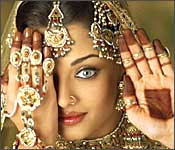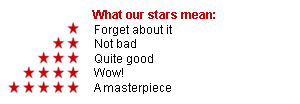|
|
| Help | |
| You are here: Rediff Home » India » Movies » Reviews |
|
 Aishwarya Rai | ||
| |||||||||||||||||||||||
|
| |||||||||||||||||||||||
Muzzafar Ali's Umrao Jaan [Images] was an unusual feat. It seamlessly merged the aesthetics of an art film with the gloss of a commercial one.
Though its ornate visuals and gorgeous cast made it an entrancing film one cannot forget that Khayyam's music and Shahryar's poetry had a huge part to play in its success.
Circa 2006, filmmaker J P Dutta tries to re-create the aura in his interpretation of Mirza Mohammed Haadi Ruswa's Urdu novel of the same name. Starring Aishwarya Rai [Images] (looking precious in the promos), Abhishek Bachchan [Images], Suniel Shetty [Images] and Shabana Azmi [Images], this Umrao Jaan too comes in glamorous packaging.
But already its music composed by Anu Malik [Images] with Javed Akhtar's lyrics doesn't quite measure up to the original. It doesn't showcase the kind of shayari that extracts spontaneous waah waahs.
A brief strain introducing the courtesan in question, inaugurates the album via Alka Yagnik's shrill and conscious presence in Ek toote huye dil ki.
 Javed Akhtar volunteers to give a foreword, which introduces the artistic temperament of Lucknow and its soulful inhabitant Umrao Jaan 'Ada'.
Javed Akhtar volunteers to give a foreword, which introduces the artistic temperament of Lucknow and its soulful inhabitant Umrao Jaan 'Ada'. Umrao Jaan garners a warm reception as she offers a stylish and sonorous Salaam. Coyly rendered and elegantly composed, Salaam transports you into the era of nawabs and nazams. No wonder then that the beautiful composition is featured twice in soundtrack.
Just when you begin to lounge comfortably in the ghazal zone, Pehle pehle shows up. A tedious effort at musicmaking from Malik, Pehle -- a pale mix of shehnais and saraangi; wanders off aimlessly against Akhtar's exhaustive use of metaphors.
A crestfallen Umrao articulates the sting of pain caused from an ill-fated romance in Jhute ilzaam. Malik transforms her circumstances in a classically enriched melodious outcry.
With Main na mil sakun jo tumse, Umrao, however, gracefully asks her beloved to give her up. Her complex, human side shows up at times as a martyr "Meri ho agar burai to dena na tum safaai (Do not offer any explanations if someone bad mouths me)" or otherwise, when she sarcastically sniffs, "Koi pooche badnaseebi ki hai imtihah koi. Toh meri misaal dena, toh mujhe namuna karna. (If someone asks the extent of misfortune, cite me as an example to them.)"
The helplessness and humiliation of gender bias is effectively expressed in the hard hitting Agle janam mohe bitiya. Both Richa Sharma and Anmol Malik (the voices for an adult and adolescent Umrao Jaan respectively) in the track's two versions do a splendid job of echoing our heroine's building frustration and terrible angst.
Tender hues of romance between Umrao and the object of her affection, and later heartache, are sketched well in Behka diya hamein. While lyrically it breathes with poetic rapture, the tune is nothing exceptional and tends to drift about insignificantly.
The soundtrack ends on a despondent footnote with Pooch rahe hain. Though the mood of the melody and its content are forlorn, Malik's bland notes fail to create empathy for Umrao's gloomy state of affairs.
What makes the music of this Umrao Jaan special is that in an age of remixes and fast food music, it stands out with its leisured pace and much forgotten flavour. Sure, it's no competition to its 1981 antecedent; still it earns points for being an opulent looking album with a partially committed soul.
Rediff Rating:


|
|
| © 2008 Rediff.com India Limited. All Rights Reserved. Disclaimer | Feedback |